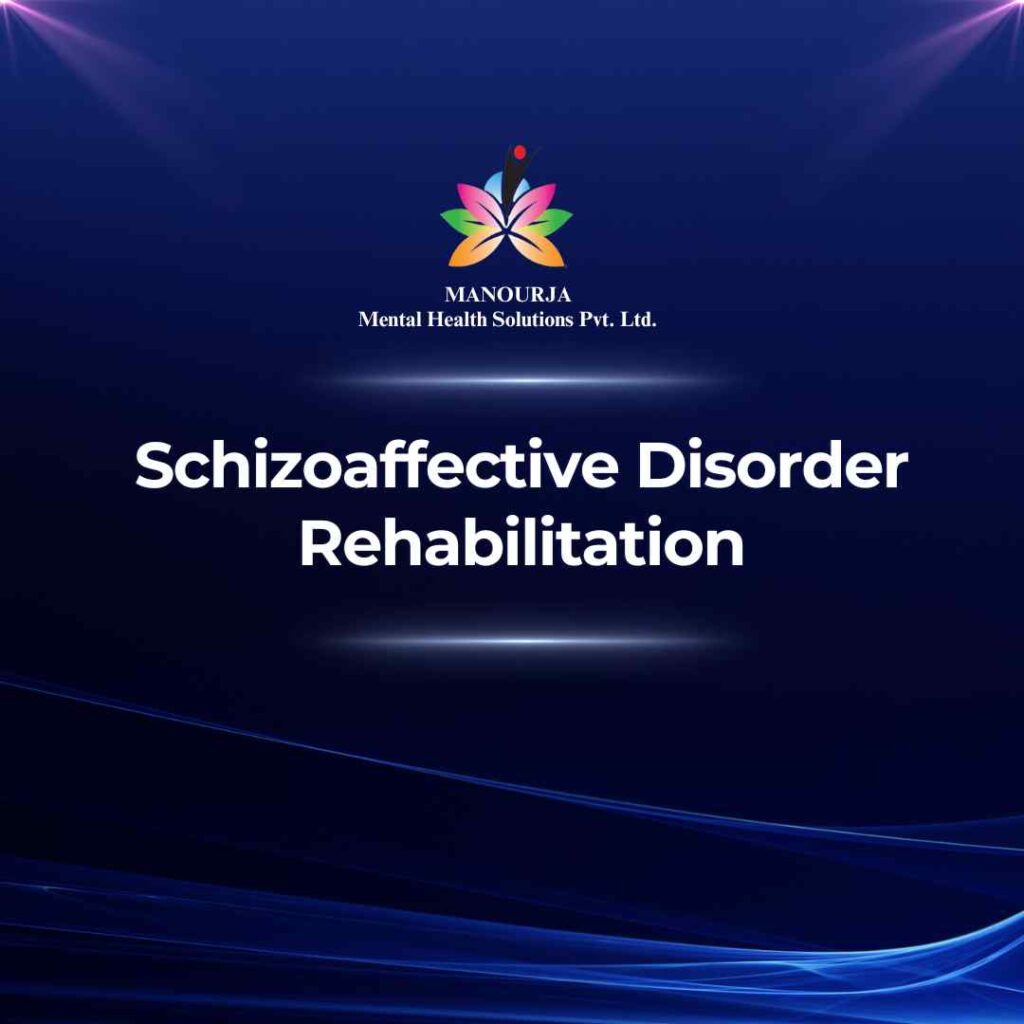Schizoaffective Disorder Rehabilitation

Schizoaffective Disorder is a complex mental health condition characterized by a combination of schizophrenia symptoms, such as hallucinations or delusions, and mood disorder symptoms, such as depression or mania. It’s important for family members and individuals themselves to recognize the signs and symptoms of this disorder to seek appropriate treatment, which can range from outpatient (OPD) to inpatient (IPD) psychosocial rehabilitation.
Signs and Symptoms of Schizoaffective Disorder
The key indicators of Schizoaffective Disorder include:
- Psychotic Symptoms: Hallucinations (seeing or hearing things that are not there) and delusions (false beliefs).
- Mood Disorder Symptoms: These can include episodes of depression (sadness, lack of energy, loss of interest in activities) or mania (elevated mood, increased energy, risky behavior).
- Impaired Functioning: Difficulty functioning at work, in social situations, or during routine activities.
- Disorganized Thinking: This may manifest as speech that makes little sense or difficulty in organizing thoughts.
- Decreased Emotional Expression: Flat affect or reduced expression of emotions through facial expression or voice tone.
Indicators for OPD vs. IPD Psychosocial Rehabilitation
Outpatient (OPD) Psychosocial Rehabilitation
- Suitable for individuals who have stable symptoms that can be managed in a less restrictive environment.
- Effective for patients who have strong support systems at home that can help manage day-to-day challenges.
- Appropriate for those who are able to maintain a certain level of independence in daily activities.
Inpatient (IPD) Psychosocial Rehabilitation
- Necessary for individuals experiencing severe psychotic episodes or who are at risk of harming themselves or others.
- Required for patients whose symptoms are poorly controlled with outpatient treatment or who need intensive care to stabilize their condition.
- Recommended when the individual’s living situation does not provide the stability or support needed to manage their symptoms effectively.
Factors Influencing the Decision
- Severity of Symptoms: More severe symptoms often necessitate IPD to ensure safety and provide intensive treatment.
- Risk of Harm: The potential risk to oneself or others can warrant more controlled and closely monitored settings like IPD.
- Support System: The presence or absence of a reliable and supportive home environment is crucial in deciding the level of care.
- Treatment History: Previous responses to outpatient or inpatient treatment can guide the current level of care needed.
Role of Psycho-social Rehabilitation in Treating Schizoaffective Disorder
Psycho-social rehabilitation aims to help individuals manage their symptoms, improve their functioning, and enhance their ability to live independently through:
- Skill Building: Focusing on life skills and social skills to improve daily living and social interactions.
- Therapeutic Interventions: Individual and group therapies to address both psychotic and mood symptoms.
- Medication Management: Ensuring optimal treatment with medications to manage mood swings, psychosis, and other symptoms.
Techniques and Approaches Used at MANOURJA
The rehabilitation process at MANOURJA may include:
- Cognitive Behavioral Therapy (CBT): For addressing delusional thinking and helping manage reactions to hallucinations.
- Dialectical Behavior Therapy (DBT): Used to control intense emotions and improve relationships.
- Social Skills Training: To enhance interpersonal skills and social interaction capabilities.
- Family Therapy: To educate family members and improve their ability to support the patient effectively.
- Occupational Therapy: To develop job skills and facilitate successful employment or volunteer opportunities.
Steps in the Rehabilitation Process at MANOURJA
- Comprehensive Assessment: A thorough evaluation to understand the extent and impact of symptoms.
- Individualized Treatment Plan: A tailored plan that addresses both the psychiatric and psycho-social needs.
- Implementation of Treatment Strategies: Engaging in various therapies and activities designed to target specific symptoms and areas of dysfunction.
- Ongoing Monitoring: Regular reviews to assess progress and adjust treatment plans as needed.
- Long-term Support Planning: Preparing for transition to community living and ongoing support to maintain gains and manage symptoms.
Effective psychosocial rehabilitation can significantly improve the lives of individuals with Schizoaffective Disorder, helping them to regain control over their symptoms and reintegrate into society with confidence and success. The comprehensive approach at MANOURJA ensures that individuals receive personalized care tailored to their unique needs.
“Every step you take is a move toward reclaiming your life—embrace the journey towards healing and hope.”
